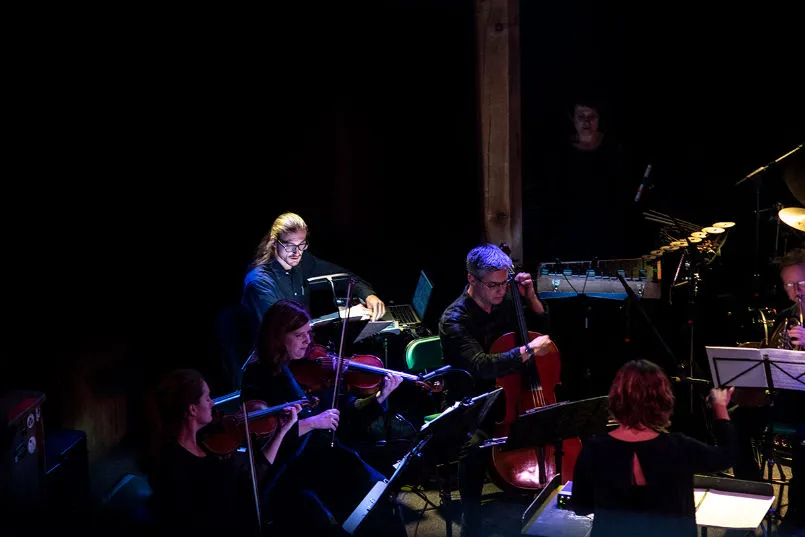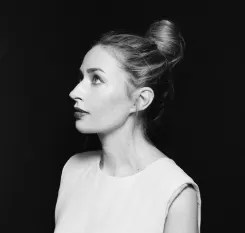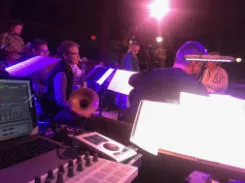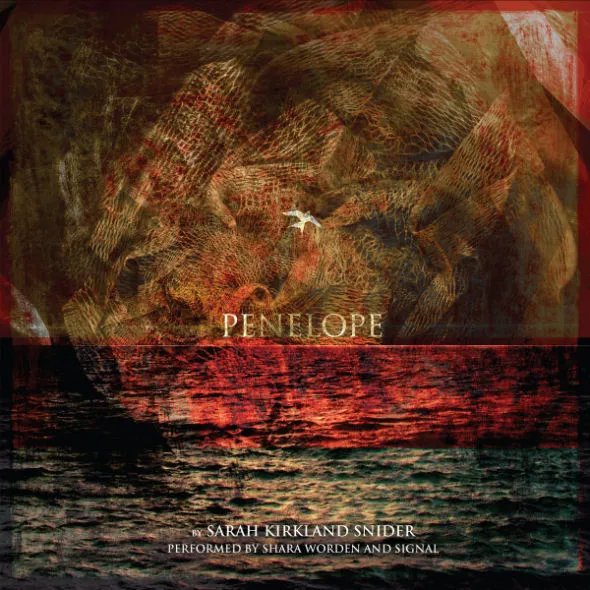Penelope, Sarah Kirkland Snider's
electroacoustic song cycle
A contemporary re-imaging of the Odyssey
Gahlord has been the laptop electronics performer for Sarah Kirkland Snider's Penelope several times with different ensembles and conductors.Performances:
05/08/19: w/ Ensemble Uncaged*
03/26/19: Roulette w/ String Theories*
08/16/18: Lake George w/ LGMF
11/02/18: Rusty Nail w/ TURNmusic
11/01/18: FlynnSpace w/ TURNmusic
*Oh coronavirus... Each time is a magical and unique experience. He looks forward to performing in this role again.
The theatricality of the sound design blends the songs together over the course of an evening, accentuating the mood and meanings of the lyrics by playwright Ellen McLaughlin.

Photo by Mollie Coons.
Sarah Kirkland Snider, Penelope interview
Below is an interview with Sarah Kirkland Snider recorded for the a radio showDewald, Gahlord. "Sarah Kirkland Snider"...and electronics. Audio, Oct 31, 2018. hosted by Gahlord Dewald. In it, they discuss creating the electronic elements for Penelope as well as some of the considerations for performing and presenting it.
Gahlord Dewald:I'm very excited to have Sarah Kirkland Snider, composer and also artistic director of New Amsterdam Records, here to talk about her process with making music that incorporates an electronic element. Welcome to the show, Sarah.
Sarah Kirkland Snider: Sarah Kirkland Snider, Penelope composer
Thank you so much for having me Gahlord. I'm excited to speak with you.
Sarah Kirkland Snider, Penelope composer
Thank you so much for having me Gahlord. I'm excited to speak with you.
GD:Let's jump right in. How did the electronic element come to be in Penelope?
SKS:The initial version of the music was for a play and we didn't have any sound design in the play. But when it came time for me to transition the material from music for a play into a song cycle, I kept thinking about the theatrical aspect of the storytelling. I kept craving a broader canvas, a more cinematic approach to telling the story.
With electronics, of course, you can bring in field recordings and have a lot of very specific references. From war sounds to nature sounds to sounds of humanity, et cetera, et cetera. And I thought that would help tell a story in a richer, deeper, more multi-dimensional way. It was a narrative impetus.
GD:How did you select your collaborator? How was that working relationship? How did that come about and what was it like as a composer?
SKS:Michael Hammond is a friend of mine. He also is a colleague of mine. He works at New Amsterdam Records, which is the record label that I co-artistic direct. When I first met him, he was working for us as an intern. He had just graduated from Princeton University as a music major and had studied with my husband, who teaches there. So I'd gotten to know him that way.
He had designed a lot of his own software. And he had a lot of electronic music that he'd created that I thought was really beautiful. So I thought he would be the perfect person to be my shepherd and help guide me through the land of electronics creation because I did not know how to use Ableton or, in fact, any electronic software.
I was in a rush to make this project happen. I mean, relatively speaking, I felt like I didn't have time to learn the program. So he offered to help me and we began this long, wonderful, collaborative process of meeting for many hours to work through my ideas, together.
It was really a lot of fun because I came to Michael with this huge library of ideas. Different pieces of music that had a sound that I loved. Or, for each song, I'd written down a long list of references and ideas for different songs, different sounds, different field sounds. I'd gone through banks of sound libraries finding nature sounds or sounds of scraping or crowds in a soccer game cheering. And so we went through all these sounds and then we listened to all this different music and talked about “How did they get it? How'd they make that sound cool in this way?”
A lot of this was in order for us to develop a working vocabulary because I didn't know the names for the differences in these filters and these sounds. These very basic, yet unfamiliar to me, terms. We had a lot of fun doing that in the beginning, and then we got into the nitty gritty of making each piece.
It was really just like a step by step process of “okay, I'm hearing this, can we try this?” And then Michael would either go back home or sit there for an hour and come up with something that sounded like what I had shown him that I was aiming for.
And bit by bit we get to it that way. This is the part of the process that I thought was the most fun. Me saying something like “Circe and the Hanged Man,” at the end, I wanted it to sound like there were two people standing with sticks tossing balls of fire back and forth. So he was laughing about this description and we were trying to figure out what that would sound like.
It was often these visual images that I would have and he would try to come up with something. Then we'd get together and just keep tweaking it. It was a lot of hours of sitting there and kind of twisting knobs and trying things until we got what we were looking for.
GD:Has the process of adding the new vocabulary had any kind of impact on your other compositions? Has it changed or altered the way you think about sound?
SKS:I think, yeah. Working with electronics in Penelope definitely made me much more aware of it in a lot of the music that I love, which previously I had not paid as much attention to.
When I created another song cycle, after Penelope, I used electronics there as well. And we had a similar working process with that. It's a really big decision because it changes a piece so much to add electronics, of course. It completely changes the experience of the music and the meaning of everything you're hearing. The meaning of the acoustic music. It's such a wildly different experience of hearing some notes of music. If you've got this other backdrop behind it, this context changes everything. For instance, I'm about to record a mass for choirThis music would become Mass for the Endangered. and I'm really on the fence about whether to add electronics to that. And I think I've decided that I won't decide until I hear the rough comps of the first tracks.
GD:What's it you're waiting for?
SKS:Well, like for me, it's all about the listening the recording experience. I'm not thinking about the live experience. I'm just thinking about what is the ideal version of this music on tape, on headphones. Because I grew up listening to so much music on recordings. I was just a recording junkie and communing with music on headphones is the best experience for me.
So I think I'll just need to hear the choir on the tracks and feel what's there. But I feel like I can't tell that in the abstract until I am hearing the takes. For instance, with Penelope and the electronics, I did a certain amount before we went into the studio. But then I wound up changing a lot of it after and doing it hand in hand with the mixing.
GD:As a result of how it sounded in context with the acoustic instruments?
SKS:Yeah, exactly. Once we had created some sound design for the live performance, which I ended up changing for the recording. So it's a funny thing, but you never know how music is going to play in the audio space. I find it really depends on how whoever's mixing it is mixing it. You're constantly shaping this clay in response to what you're hearing from the mixing engineers. So for me that was how that process had to work, shaping it in response to the mixes as they evolved
GD:The context of the audience member, whether you're sitting in a room with a bunch of other humans and some performers, or whether you're in that direct relationship via headphones, these two different experiences, the live experience is not the same as the recorded experience.
SKS:No, not at all. And in fact, I'm often frustrated by the electronic component when I'm in a live performance with either Penelope or Unremembered because it's always different of course, depending on the sound system and the speakers and the placement of the speakers, you know, and different elements are more pronounced than others. And I don't have control over that, so that's frustrating. Yeah.
GD:I think about that even though I'm the one turning the knobs. In Penelope I've got several faders that control a couple different stems or groups of instruments and sounds. Gahlord's point of view from within TURNmusic, performing Penelope. And just as a performer in that environment, trying to get a good mix, you know, it really does depend tremendously on “What's my monitoring situation?” Is there a speaker right next to me that makes me feel like my sound is too loud or too quiet. And then I turn the knob, but out in the audience who knows? As a performer, trying to be like crucially aware of this, isn't just setting up a laptop. I have to really think about it and respond.
Gahlord's point of view from within TURNmusic, performing Penelope. And just as a performer in that environment, trying to get a good mix, you know, it really does depend tremendously on “What's my monitoring situation?” Is there a speaker right next to me that makes me feel like my sound is too loud or too quiet. And then I turn the knob, but out in the audience who knows? As a performer, trying to be like crucially aware of this, isn't just setting up a laptop. I have to really think about it and respond.
SKS:Exactly.
GD:Because the the live musicians are doing it. And they're very consistent, but it's music, you know? So yeah. You go where you go with it on the day that you do it.
SKS:Exactly. And that's incredibly exciting, but it also can be scary. Right.
GD:Right. As a double bassist, if I get a little bit loud, a conductor will tell me to, you know, tone it back. But on the laptop, it's like, I'm a whole army of people.
SKS:You're the whole set.
GD:Yeah, it's an interesting spot.
SKS:You're the set. You're the whole world this music is resting in, taking place in.
GD:I think some of it is having the good fortune to perform with a conductor that's aware of that issue as well. And she can, be like, “Hey, turn down a little bit” or raise it like a conductor. But also it's not every conductor out there that has experience working with this stuff alongside the regular orchestra. So it's a unique challenge as a performer and as an ensemble, too.
SKS:Yeah, absolutely. It really is. I mean, especially working with click track, it's really challenging. Some would say it inhibits musicality, but in some senses your ears have to be that much more open and listening to everybody else in order to manage it.
GD:Yeah we've all worked with some metronomes and we can make a go of it. Session musicians obviously play with clicks all the time. I think the challenge is getting the orchestra and the instruments to really breathe, you know, while still maintaining adherence to the click. So that the scripted events come off at the right time. It's not something that you get done if you've never done it before. You really have to practice it.
SKS:Right. Exactly. Yeah, you really do. There's certain conductors that have a really tough time with it. I would be one of them. I think it's incredibly difficult. To have that musicality and breathe within that structure is tricky.
GD:It's a skill, it's a specific skill.
SKS: Yeah. Definitely
GD:Your process of working on Penelope sounds like you had a great time doing it and you've continued to add electronic elements into your music. What kind of advice would you give to composers who are considering adding an electronic element, either on their own or working with a collaborator as you've done?
SKS:I think if you have the time to learn a program yourself, I think that's the best way to do it. Because then you don't have to pay somebody to help you. But if, like me, you're feeling short on time and you know. I'm a relatively late starter as a composer and I was trying to learn orchestration and catch up on all these other things. So I just thought this is one thing I have to outsource to a certain degree. It's a totally valid way to go about it.
GD:It's absolutely a valid way of making sound, to have a collaborator.
SKS:Yeah. I liked what you said too about debunking this myth of the solitary genius. I think this idea we have about composition in general is that it's supposed to be this mythological active creation by a genius. And you know, so many of the world's best ideas come from sitting around and having a conversation with your close friends and having people egg you on to something.
A lot of great things can happen between two people sitting in a room. Or like Michael and I, there was definitely so much creative synergy and he had a lot of great ideas that then I would get ideas just from talking with him further. So I think that's why with Unremembered I was like, I don't even want to bother learning Ableton at this point. I just want to work with Michael because I know we have this great thing that happens when we get together and do this.
I think it's a great way to go for a lot of people. I think the trick of it is that it can get a bit expensive. Fortunately, when I was starting with Penelope Michael was fresh out of college and he was hungry to work. He was very generous with his time and his fee. With Unremembered, we considerably raised the fee as was appropriate.
So it's always a balancing act, finances and figuring all of that out, the economics of the thing. But I think however you can make it work is the way to make it work. Whatever will get you generating ideas the fastest and making music the fastest, and in a way that's comfortable for you creatively. That's what you should do.
I think oftentimes people, especially when it comes to technology, can feel intimidated. At least I know that I can, I'm often intimidated by technology. And I think some of this is gender conditioning. I'm 45. And in my day growing up, it was like girls don't compose, let alone bother with electronics. And I had teachers, many teachers, say that to me: “oh, you're a girl. You probably won't want to bother with electronics.” And you start to absorb that message after a while. It's a bad thing. I think a lot of younger generations aren't dealing with that as much.
However you can get to from A to Z is fine. So, will I learn Ableton or Max or any of these programs? I don't know at this point, I would rather be studying orchestration and using my limited time to learn new tricks in that way. But maybe at some point that'll change and I'll want get more into the nitty gritty of electronics.
But I think there's no right or wrong. You should do whatever works for you to get to a creative end result.
GD:That's fantastic advice. We don't expect the composer to learn how to play the violin and the viola and the cello and the double bass and all this other stuff. We don't expect them to do that. So why would we necessarily expect them to do all these other things too? Or I think about it as a performer, composers will send me things they're working on for double bass, they'll ask “Is this possible or not?” It's not very different from having a collaborator working on the laptop and going back and forth. When I get shipped scores I will give suggestions, “That's a cool idea there. But if you give me a little time to pick up the bow, then that's going to get a better performance”
SKS:Exactly. That's the normal process. It's a normal process. It's a whole lot like that.
They're making these programs so much easier to use now too. I remember 20 years ago I was trying to teach myself Logic and getting so frustrated with the user manual. And it's so much clearer now. So hopefully younger generations of students will not have too much trouble learning these things on their own in school. But I think there's no shame if that wasn't an option, to just ask for help and make it work however you can with friends or assistants.
GD:It's been great having you on this show. A lot of fun talking with you. I am excited to be playing Penelope in a couple weeks and looking forward to hearing the new recordings that you've been putting out. So thank you so much.
SKS:Thank you so much, Gahlord. And I'm so excited that you're performing it. It's great to meet you. I wish I could get up there to hear it. But I'm looking forward to hearing about It.
GD:You'll hear about it on the social media. It'll be all over the place. <laugh>
SKS:<laugh> That's good. Fantastic.
Performance and production details
Penelope is available from Wise Classical and exists in several forms each with their own premieres.McDowell, Robert W.. "'Penelope,'' a New Play Written and Performed by Ellen McLaughlin, Will Premiere at PlayMakers Rep." Triangle Arts and Entertainment, April 24, 20212 "Penelope - March 30, 2019 | Lyric Opera of Kansas City." Lyric Opera KC, retrieved 01/18/2022 Current versions of Penelope include:
- Music Theater (2007): actress/singer + string quartet
- Chamber Orchestra Orchestra (2009): voice, chamber orchestra, laptop
- Large Ensemble (2010): voice, 10 piece ensemble, laptop
- Septet (2010): voice, 7 piece ensemble, laptop
- Sextet (2010): voice, 6 piece ensemble, laptop
| World Premieres, a selection/incomplete | |||
|---|---|---|---|
| Music Theater | Sextet | Septet | |
| Date: | 04/25/2012 | 03/30/2019 | 06/15/2019 |
| Location: | Elizabeth Price Kenan Theatre, Chapel Hill, NC | Michael & Ginger Frost Production Arts Building, Kansas City, MO | Natalie L Haslam Music Center, Knoxville, TN |
| Conductor: | Lisa Rothe (director) | Carolyn Watson | Andrew Bliss |
| Ensemble: | Chamber Orchestra of the Triangle String Quartet | Kansas City Lyric Opera Quintet | Nief-Norf |
| Vocalist: | Ellen McLaughlin | Annie Rosen | unknown |
| Electronics: | NA | Michael Hammond | unknown |
